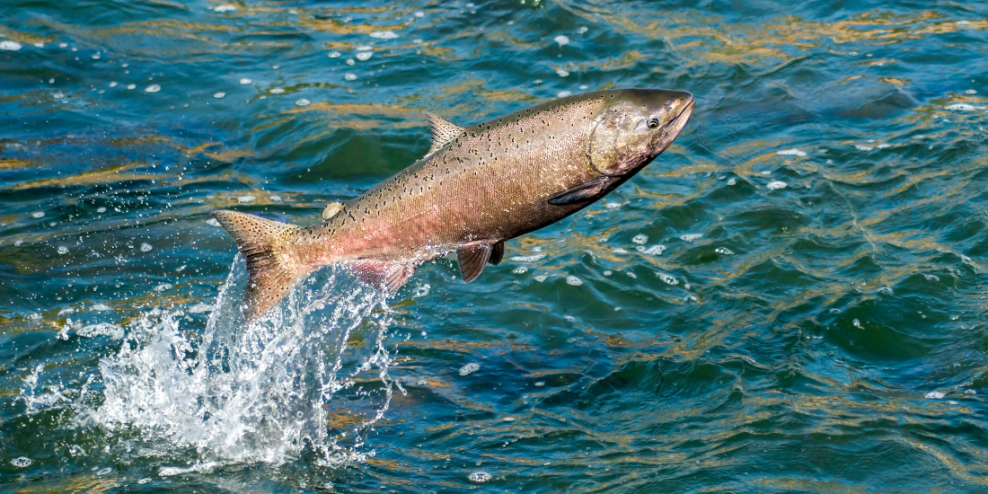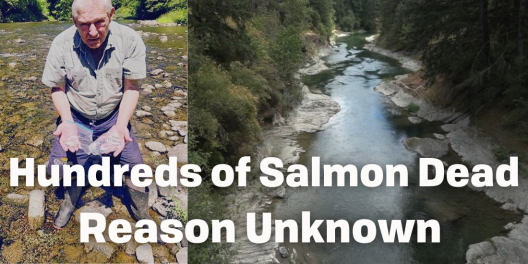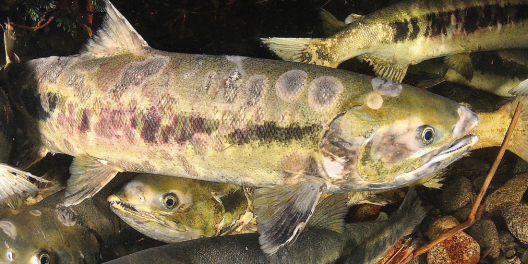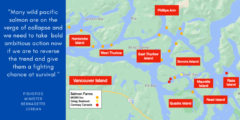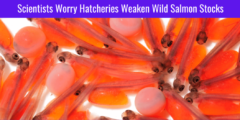Leading Canadian research scientists are slamming a Fisheries and Oceans Canada (DFO) report about fish farm sea lice and wild salmon. They say this is because of its “serious scientific failings.”
Known as a “Science Response Report,” DFO released it late in January. The report was meant to guide an upcoming decision by fisheries minister Joyce Murray on the future of fish farms in BC, including in the Discovery Islands.
Instead, critics are painting a picture of a report full of holes and sloppy science. It has become an embarrassment for the federal agency responsible for managing wild salmon and fish farming.
A letter sent to Minister Murray from a group of professors and research scientists expressed deep concerns “with the report’s flaws.” Most notably, the report claims that sea lice from fish farms don’t impact wild juvenile salmon.
They say this finding contradicts more than 30 scientific papers in BC linking sea lice on wild salmon to fish farms in the province. They also point to many more international studies.
Sean Godwin is a scientist at SFU. He’s also one of 16 fish disease and ocean science experts who signed the letter.
In a recent story in The Narwhal, Godwin called the DFO report “one of the worst pieces of science I’ve ever seen come out of a government agency.”
“Wild salmon are suffering from death by 1,000 cuts right now,” he said. But sea lice are “definitely a big issue and one of the only ones that is actually kind of manageable.”
In the scathing letter, the scientists criticize almost everything about the DFO’s sea lice data. This includes how it was analyzed, the people who wrote it, and how it was reviewed.
First, a simple re-analysis of the report’s results show a strong link between sea lice on Atlantic salmon farms and sea infestations among wild juvenile pink and chum salmon. In other words, the exact opposite of what the controversial DFO report claims.
Second, the report was produced by an in-house team stacked with employees of DFO’s Aquaculture Management and Aquaculture Science branches. A branch notorious for being biased in favour of the fish farming industry. That’s hardly a way to keep bias out of government research!
Third, DFO says that the report is peer-reviewed. That means independent scholars assess the quality of the research and the findings before it is published. The key here is that the reviewers are supposed to be independent.
Usually, legitimate research will have more than one reviewer. This is to eliminate the possibility of bias as much as possible. Proper scientific research depends on this process.
The 16 profs and researchers who signed this letter have collectively published more than 1500 peer-reviewed scientific papers.
However, in this case, the DFO report was reviewed by just one university professor. His name is Dr. Crawford Revie, and he has connections to the fish farm industry.
The letter bluntly states that the “report falls far short of the standards of credible independent peer review and publishable science. In addition to technical flaws, we have serious concerns about the processes that generated this report.”
The 45-page critique goes on to further demolish the report’s credibility. Other flaws pointed out include the downplaying of a “large body” of independent science and data manipulation.
According to the 16 scientists who signed the letter, they aim to build public trust in DFO.
They also say they want to help improve the quality of science advice at DFO. Especially “decisions surrounding controversial files, such as salmon farming.”
DFO’s credibility when it comes to fish farms has been torpedoed. Wild salmon are already facing significant challenges; it would be comforting to know that the agency tasked with managing the fish farms wasn’t ignoring evidence of their negative impacts.
.
